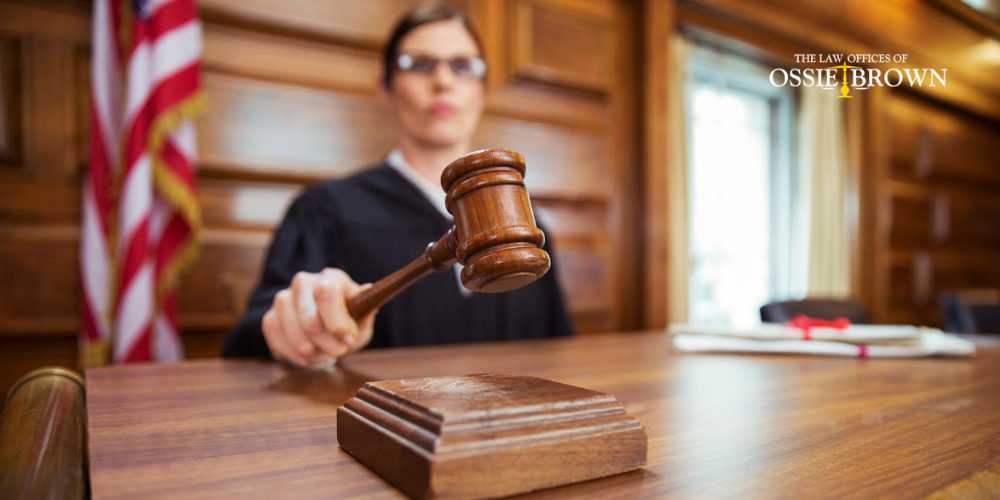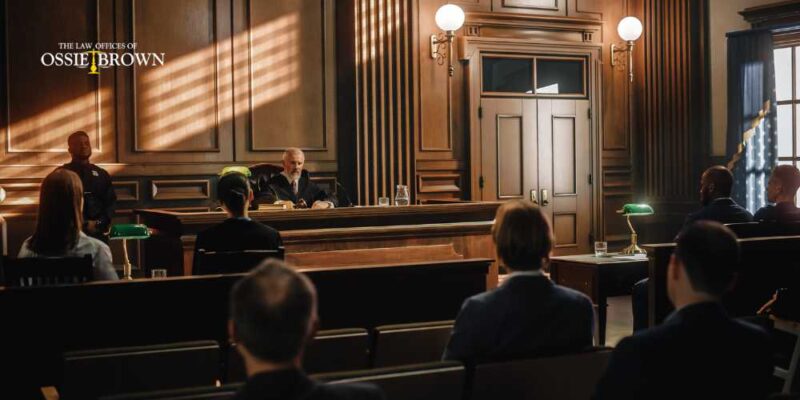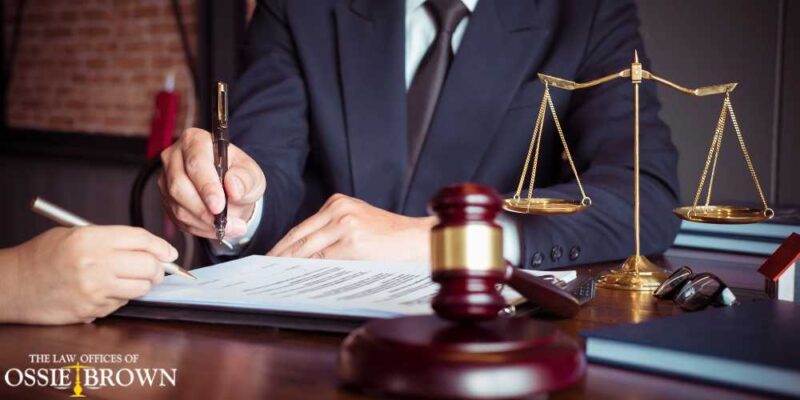In courtroom proceedings in Louisiana, when an attorney raises an objection, the judge has the option to respond with either an objection sustained or an objection overruled. If the judge agrees with the valid objection, meaning that the evidence presented or questioning is disallowed based on legal rules, he or she will sustain the objection. Conversely, when the judge overrules, it indicates that the judge disagrees and questioning and evidence rules have not been broken based on legal rules.
While high-profile cases like Depp v Heard brought attention to hearsay objections, where decisions played key roles in controlling the witness’s testimony, for us “non celebrities” in Louisiana, the distinction of overruled vs sustained is still critical in shaping the direction of criminal cases and can impact how prospective jurors interpret the evidence presented.
For those in Louisiana facing a complex criminal case, our Baton Rouge defense attorneys are equipped to navigate evidence rules and objections, drawing from law school and decades of legal experience to defend their clients effectively. Call 225-343-1111 to schedule a free consultation with an experienced criminal defense lawyer at the Law Offices of Ossie Brown
Objection Definition
In a courtroom, an objection is a formal protest raised by an attorney during a trial to prevent certain evidence or statements from being considered by the trial jury. Objections are typically made when one attorney believes that opposing counsel is presenting irrelevant evidence, improper questioning, or material that violates a legal rule. The judge decides whether the objection should be sustained or overruled, guiding what the prospective jurors and trial jury are allowed to hear and consider in reaching a verdict. Objections help maintain a fair trial by ensuring only appropriate and lawful evidence is presented.
What Does Sustained Mean in Court?
In court, when a judge sustains objections, it means the judge agrees and believes it is a valid objection. When a judge decides to sustain the objection, essentially, the judge thinks the question or evidence is improper—often because it’s unfairly prejudicial, irrelevant, or inadmissible under the rules of evidence. When judges decide to sustain the objection, they announce ‘objection sustained,’ meaning that the witness may not answer the question, and the opposing party must either rephrase or move to another line of questions. This decision keeps criminal cases fair and ensures that only certain evidence is presented to prospective jurors or the trial jury.
Objection Overruled Meaning
When an attorney objects and the judge overrules it, this means the objection overruled decision allows the statement or question to remain as part of the proceedings. Essentially, the judge does not agree with the objection, so the witness answers or proceeds with the testimony as directed.
What Does it Mean When a Judge Overrules an Objection?
An objection overruled means the judge finds the question or evidence acceptable, often because it may prove relevant facts or does not violate court rules. This overrule allows the jury to consider the information, and the attorney can continue with their questions without needing to modify it further.
Common Objections in Louisiana
Here are the most common objections, as well as when you’ll typically hear objection sustained or objection overruled in Louisiana.
Hearsay Objection
A hearsay objection is raised when the witness answers with statements made outside of court to prove the truth of the statement itself. Hearsay is generally inadmissible in court unless it falls under a specific exception, as it relies on out-of-court assertions that limit cross-examination or when an attorney asks their own client or their own witnesses questions in a criminal case.
So, what does hearsay mean in court?
Typically, hearsay is inadmissible as evidence because the original witness or source is not present in court to be cross-examined, which raises concerns about the statement’s reliability. For instance, if a witness testifies, “My neighbor told me they saw the defendant at the scene,” this is considered hearsay because it relies on something other than firsthand information presented.
Objection Leading Questions
The leading questions objection occurs when an attorney objects to leading questions that suggest the answer within the questions themselves. Leading questions are typically only allowed during the cross-examination, where attorneys ask their own witnesses questions, as they can influence how the witness answers and are inappropriate in direct examination where the other side “leads” the witness in the courtroom. During direct examination, the lawyer must rephrase the question so that the person required to answer can present statements in a way that doesn’t unfairly influence the jury.
Objection Relevance
Objection Relevance is raised in court when one attorney believes that a piece of testimony or evidence is irrelevant to the pending verdict of the trial. Relevance objections are used to prevent a witness or opposing counsel from trying to present irrelevant evidence, as this can be unfairly prejudicial, which could mislead or confuse the jury.
If the judge agrees with the other attorney and finds that the information does not directly relate to proving any fact in the criminal case, the judge will sustain the objection, and the witness may not answer. Opposing counsel may object during direct examination or cross-examination to keep the focus on pertinent facts.
Objection Speculation
Speculation objections occur when a witness provides testimony about things they assume or guess rather than directly know. An attorney may object because only firsthand knowledge is permitted, ensuring that the witness’s statements are factual rather than hypothetical. Limiting unfair reasonable doubt from speculative statements.
Badgering the Witness
An argumentative objection is raised when a lawyer is not merely asking a question but is instead making statements, often challenging or badgering the witness. These objections ensure that only information presented as factual, rather than confrontational or biased, reaches the jury. Opposing counsel may say, “badgering the witness” or “argumentative” if the opposing party is arguing with the witness rather than seeking an answer.
The ruling on this helps maintain fairness in the courtroom and ensures that questions aim to prove facts rather than to unfairly sway the jury against the other side. Argumentative objections are more common in cross-examinations, as the direct examination is usually limited to straightforward questions.
Objection Lack of Foundation
A lack of foundation objection is raised when a lawyer introduces evidence or testimony without first providing essential context, or “foundation,” to show its relevance and reliability according to evidence rules.
For instance, before presenting certain evidence, the lawyer must establish details such as the source, time, and place to ensure it meets law standards and is not irrelevant evidence. If the judge sustains this objection, the answer or evidence is excluded until a proper foundation is established.
These objections can be used by a lawyer questioning their own witnesses or by opposing counsel to prevent unclear or unsupported evidence from reaching the jury. By following this rule, the court ensures only properly vetted evidence is considered in the trial.
Objection Assumes Facts Not in Evidence
Assumes Facts Not in Evidence is raised when a question by the opposing party presumes certain evidence or facts that have not yet been introduced or proven in court. When the opposing counsel includes unproven information in a question, it can lead the witness to provide an answer based on assumptions rather than actual facts, potentially misleading the jury.
Judges sustain these objections to ensure that only established facts are present, keeping the trial fair and focused on verified information. If the other side poses questions that assume facts not yet in evidence, it can unfairly influence the verdict by introducing unproven details that may sway the jury’s perception.
Objection Narrative
A narrative objection is raised when a witness begins to provide an open-ended answer that goes beyond the question asked, often leading to irrelevant information. In court, a narrative answer can present challenges, as they may include details not properly admitted, which could confuse the jury or detract from the focus of criminal cases.
During direct examination, opposing counsel might object if the witness’s answer becomes unfocused. If the judge thinks the answer could undermine clarity, they may sustain the objection and instruct the witness to answer more concisely. This ruling helps ensure only relevant testimony is heard, maintaining fairness and avoiding unnecessary influence over the verdict. Narrative objections can also help prevent undermining the goal of establishing reasonable doubt or solidly trying to prove a point in court.
Asked and Answered Objection
An asked-and-answered objection is raised during a trial when an attorney repeats the same question or topic that a witness has already addressed. These objections prevent unnecessary repetition, which can waste time and potentially influence the jury by overemphasizing certain points. Judges often sustain the objection to keep the trial focused, ensuring that only relevant testimony is presented. Repetitive questioning may also lead to issues on appeal if it affects the fairness of the trial. When an objection sustained is issued, it stops the other attorney from asking the same question again, maintaining the integrity of the evidence presented without the need for leading questions to overly emphasize a point the attorney is trying to prove.
In addition to common objections like hearsay and relevance, several other types of objections are frequently used in court.
Improper Character Evidence: objections are raised when a witness’s testimony or evidence focuses on a person’s character traits that are not relevant to the case unless a specific rule allows it.
Vague or Ambiguous objections apply to questions that are unclear or confusing, potentially leading to misleading or misunderstood answers.
Calls for Speculation are used when a question asks a witness to guess or assume something beyond their firsthand knowledge.
Unfair Prejudice objections argue that certain evidence, while possibly relevant, is unfairly prejudicial and could unduly sway the jury emotionally against one party.
Privilege objections protect information exchanged within confidential relationships, like attorney-client or doctor-patient, from being disclosed in court.
Calls for Conclusion may be raised when a question prompts a witness to make a legal conclusion rather than providing factual testimony.
Cumulative prevents unnecessary repetition when the same information is being presented repeatedly by different witnesses or pieces of evidence.
Each of these objections helps maintain a fair trial by ensuring that evidence and questioning stay focused, clear, and within legal guidelines.
Louisiana Court Evidence Rules
To understand objections, as well as objection sustained or overruled, there are specific standards governing the legal representation of evidence and questioning in court. The Louisiana legal system operates under a set of well-established principles and guidelines known as the rules of evidence. These evidence rules are designed to ensure that every trial is are conducted fairly.
The voir dire, or jury selection process requires structure from the court and attorneys interviewing prospective jurors. This process requires time and effort from all parties. Judges take each rule, as well as their decisions to declare objection sustained or overruled seriously.
Trial Jury Should Hear Properly Admitted Evidence
One of the fundamental principles of the rules of evidence is that a witness can only present facts that are properly admitted as evidence. This means that any testimony presented by a witness must conform to the rules set by the court. If the other attorney believes that certain testimony or evidence offered by a witness violates these rules, opposing counsel can raise objections to prevent the jury from having reasonable doubt that is unjust to their client.
Witnesses Must Be Cross-Examined
Another key aspect of the rules of evidence is the cross-examination of witnesses. Cross-examination allows opposing counsel to question the credibility and reliability of the witness’s testimony. This is why witnesses generally can’t use information that another person told them (also known as “hearsay testimony”) as actual evidence. It is during this phase that objections often come into play, as attorneys seek to challenge the relevance or admissibility of questions posed to witnesses in order to sway the verdict.
Overruled vs Sustained – The Trial Judge Agrees or Disagrees With the Objection
The crucial distinction between “objection sustained” and “objection overruled” lies in the trial judge’s ruling. When a judge sustains an objection, or they agree with it, they acknowledge that the objection has merit and that the evidence or statement in question is inadmissible or inappropriate according to the rules of evidence. This decision often benefits the objecting party by preventing potentially prejudicial or irrelevant information from reaching the jury.
On the other hand, when a judge disagrees or overrules an objection, they decide that the objection lacks merit, and the evidence or statement can proceed. This judge rule favors the party introducing the evidence or making the statement, as it allows their argument to continue without interruption.
It’s important to note that a judge’s ruling is not set in stone; it can vary depending on the specific circumstances of each case. Judges are responsible for making these decisions based on their interpretation of the law and the facts presented in the trial.
The Appellate Court Process for Objections in Louisiana
The appellate court comes into play if one party believes a judge’s decision to sustain or overrule objections affected the trial verdict. During an appeal, the higher court reviews the trial court’s decisions on objections, examining whether each ruling was legally correct. If the appellate court finds that an objection was improperly overruled or sustained in a way that significantly impacted the trial’s verdict, the higher court may reverse or remand the case for a new trial.
Baton Rouge Criminal Defense Attorneys
In the world of criminal defense law, understanding the intricacies of objections, whether they were an objection sustained or overruled, is essential for building a strong case. At the Law Offices of Ossie Brown in Baton Rouge, Louisiana, our criminal defense attorneys have extensive experience navigating the complexities of courtroom proceedings. Our defense attorneys are committed to providing effective legal representation to protect your rights and achieve the best possible outcome in your case.
In Baton Rouge, Louisiana, where the legal system can be challenging to navigate, having a knowledgeable and experienced criminal defense attorney by your side can make all the difference. Call 225-343-1111 to schedule a free consultation with an experienced lawyer from our law firm.





